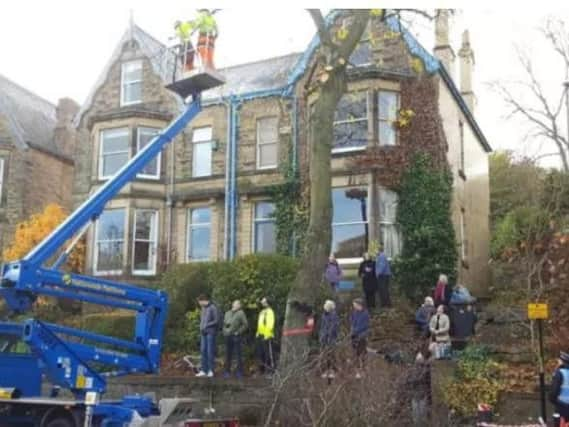Sheffield tree campaigners believe new evidence shows controversial PFI contract could be ended for free


In December, it was revealed that council leader Julie Dore had told Labour activists her party would consider ending the 25-year Streets Ahead highways maintenance contract with Amey early if it was financially viable to run services internally. The £2.2bn contract to upgrade the city’s road and pavements started in 2012, backed with £1.2bn worth of Government funding, and has involved the removal and replacement of around 6,000 of the city’s 36,000 street trees so far.
Campaigners, who argue many of the tree removals have been unnecessary, separately believe the council may be able to terminate the contract early due to a lack of records proving Amey formally disclosed details of a £30,000 fine for a health and safety offence in December 2011 prior to the signing of the Sheffield contract. The conviction under the Health and Safety At Work Act related to an incident involving the death of an employee in Liverpool in 2006.
Advertisement
Hide AdAdvertisement
Hide AdIt follows campaigners receiving general advice from a Government agency which suggested such convictions should be declared in public contracts.
But Sheffield Council today said it believes “there are no grounds for termination of the PFI contract” as it had been aware of the conviction prior to the contract being signed in 2012 - despite a Freedom of Information response from the council saying it had no written records of Amey notifying it of the conviction and a council officer’s email indicating the authority had found about the incident through the press.
The conviction was for part of the company called Amey Infrastructure Services, which was renamed as Amey LG Ltd in 2008. Amey LG Ltd is listed as a the key subcontractor on the Streets Ahead contract.
A Freedom of Information response received by campaigner Richard Davis showed Amey did not mention any proceedings in its Pre-Qualification Questionnaire for the contract and suggested it was “not required” to provide any information in relation to Amey LG and any past legal proceedings.
Advertisement
Hide AdAdvertisement
Hide AdThe questionnaire was completed in May 2009 but another FoI response confirmed the council held no information about Amey subsequently notifying it of the December 2011 conviction prior to the 2012 contract agreement.
Mr Davis had asked to be provided with a copy of the written notification sent by Amey to Sheffield Council confirming the outcome of the December 2011 case.
The response said: “Sheffield City Council can confirm that we have been unable to identify/locate any information which is relevant to your request.”
Paul Billington, the council’s director of culture and environment, said in an email in November 2017 to Mr Davis that the council had become aware of the conviction in 2011 “when it was reported by the press”. He said a review at the time concluded it “had no implications for the procurement process”.
Advertisement
Hide AdAdvertisement
Hide AdBut campaigners have been provided by advice from an official at the Crown Commercial Service, an executive agency of the Cabinet Office. The advice, which was given in general terms and did not specifically relate to issues connected to the Sheffield contract, states that under public contract law, a breach of the Health and Safety Act should be disclosed and that a contract must make provision for termination if at the time of the award the contractor had been in breach of exclusion grounds.
It said: “A contract must make provision for termination if at the time of award the contractor had been in breach of the exclusion grounds and therefore shouldn’t have been awarded the contract in the first place. If the contract terms do not include this provision, then it is implied.
“Breach of the Health and Safety Act is covered in the Public Contracts Regulations 2015 in the discretionary exclusions under the obligations in the field of environment, social and labour law.”
The Yorkshire Post asked both Sheffield Council and Amey if they could provide records showing Amey did formally notify the council of the conviction prior to the signing of the contract. Neither have done so.
Advertisement
Hide AdAdvertisement
Hide AdMr Davis, a health and safety professional, said: “It was a legal requirement for the conviction to be declared. There are no shades of grey, it's black and white.”
Paul Selby, of the Save the Nether Edge Trees group, said: “We believe Sheffield Council could terminate the 25-year PFI contract without any penalties.”
But Sheffield Council today said it did not believe this was the case.
A spokeswoman said: “The council has already responded to a number of Freedom of Information Act requests and petitions, as well as a KPMG investigation instigated by members of the public, in relation to these allegations and the suggestion that the Streets Ahead contract can and should be terminated. In doing so we have been clear that we do not agree with the assertions that are being made.
Advertisement
Hide AdAdvertisement
Hide Ad“We are aware of the health and safety conviction in 2011, and indeed were aware of it prior to contract award, and we are still satisfied that there has been no breach by Amey of the PQQ process or the Bid Process Agreement.
“There are no grounds for termination of the PFI contract.”
A spokeswoman for Amey said: “The council has already responded very clearly to this matter and is satisfied that Amey followed the PQQ process and the Bid Process Agreement correctly and continues to conform to the terms of the contract.
"Despite the very clear benefits that Streets Ahead has delivered in its first five years of investment, allegations such as this are repeatedly raised by protestors in an attempt to illegitimise the contract, purely because a small number of people disagree with the principle of replacing ailing or damaging street trees with new ones.”